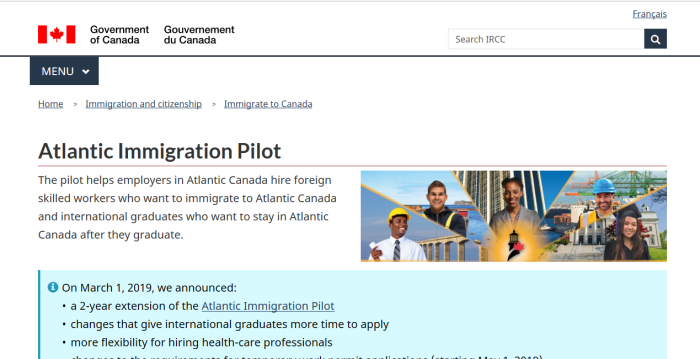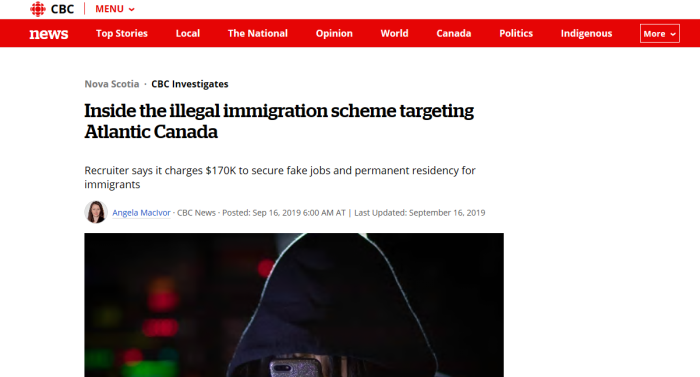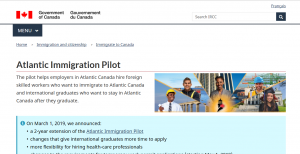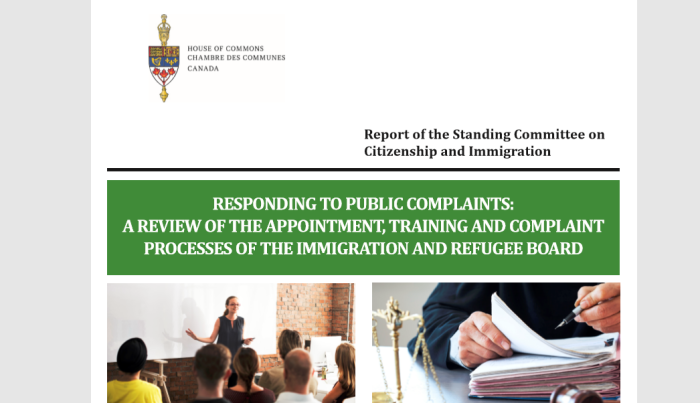(Documentary from the Fifth Estate on “Sunny Wang”. Quite good)
(Atlantic Immigration Pilot Program plagued with fraud)

(CBC: Fake job offers in Atlantic Canada)

1. Mass LEGAL Immigration In Canada
Despite what many think, LEGAL immigration into Canada is actually a much larger threat than illegal aliens, given the true scale of the replacement that is happening. What was founded as a European (British) colony is becoming unrecognizable due to forced demographic changes. There are also social, economic, environmental and voting changes to consider. See this Canadian series, and the UN programs for more detail. Politicians, the media, and so-called “experts” have no interest in coming clean on this.
CLICK HERE, for UN Genocide Prevention/Punishment Convention.
CLICK HERE, for Barcelona Declaration & Kalergi Plan.
CLICK HERE, for UN Kalergi Plan (population replacement).
CLICK HERE, for UN replacement efforts since 1974.
CLICK HERE, for tracing steps of UN replacement agenda.
Note: If there are errors in calculating the totals, please speak up. Information is of no use to the public if it isn’t accurate.
2. Important Links
(1) https://www.cbc.ca/news/canada/nova-scotia/immigration-fraud-jobs-atlantic-canada-aipp-1.5281668
(2) http://archive.is/AryL1
(3) https://globalnews.ca/news/5849305/edmonton-men-immigration-fraud/
(4) http://archive.is/0jpXE
(5) https://www.ourcommons.ca/Content/Committee/421/CIMM/Reports/RP9998461/cimmrp20/cimmrp20-e.pdf
(6) https://www.ourcommons.ca/Committees/en/CIMM/StudyActivity?studyActivityId=9955090
(7) http://archive.is/3GA7T
3. Context For This Article
Mass migration into Canada is a huge problem. Without rehashing previous articles, it causes balkanization, demographic replacement, social tensions, breaks down cohesion, strains social services, drives up housing prices, pushes down wages, and results in large sums of money (remittances) being sent abroad.
All of that aside, there is a valid question to answer: how legitimate are these cases coming into Canada? How many people are following the rules, and how many are gaming the system? It’s also valid to look into oversight and how it can fail.
4. Court Cases For Immigration Fraud
Chen v Canada (PS&EP), 2017 CanLII 72967 (CA IRB)
http://archive.is/NaVzp
Dai v Canada (PS&EP), 2017 CanLII 31963 (CA IRB)
http://archive.is/cjRIr
Du v Canada (PS&EP), 2018 CanLII 67779 (CA IRB)
http://archive.is/JMJvq
Huang v Canada (PS&EP), 2018 CanLII 137140 (CA IRB)
http://archive.is/zvB5R
Ji v Canada (C&I), 2019 CanLII 37413 (CA IRB)
http://archive.is/5FSaD
Li v Canada (PS&EP), 2018 CanLII 102184 (CA IRB)
http://archive.is/CyEgv
Li v Canada (PS&EP), 2018 CanLII 102088 (CA IRB)
http://archive.is/m1rqD
Li v. Canada (PS&EP), 2019 FC 1235 (CanLII)
http://archive.is/35hXq
Li v Canada (PS&EP), 2019 CanLII 54633 (CA IRB)
http://archive.is/ztbgS
Li v Canada (PS&EP), 2019 CanLII 109016 (CA IRB)
http://archive.is/Se5tm
Liheng v Canada (PS&EP), 2018 CanLII 14516 (CA IRB)
http://archive.is/IglAi
Lin v Canada (PS&EP), 2018 CanLII 13950 (CA IRB)
http://archive.is/fX0tW
Liu v Canada (PS&EP), 2017 CanLII 98345 (CA IRB)
http://archive.is/PjMwZ
Liu v Canada (PS&EP), 2017 CanLII 98355 (CA IRB)
http://archive.is/Ld5lE
Lou v Canada (PS&EP), 2019 CanLII 90447 (CA IRB)
http://archive.is/2QCcU
Shi v Canada (PS&EP), 2018 CanLII 139479 (CA IRB)
http://archive.is/clhDG
Shi v Canada (PS&EP), 2018 CanLII 140634 (CA IRB)
http://archive.is/uOsLO
Sun v Canada (PS&EP), 2017 CanLII 98347 (CA IRB)
http://archive.is/IubgR
Wang v Canada (PS&EP), 2018 CanLII 26840 (CA IRB)
http://archive.is/QKs1k
Wang v Canada (PS&EP), 2018 CanLII 36952 (CA IRB)
http://archive.is/bbeWz
Wang v Canada (PS&EP), 2018 CanLII 37839 (CA IRB)
http://archive.is/W4m3b
Xiu v Canada (PS&EP), 2018 CanLII 72624 (CA IRB)
http://archive.is/953Tq
Yan v Canada (PS&EP), 2019 CanLII 37396 (CA IRB)
http://archive.is/wVTN9
Yang v. Canada (C&I), 2019 FC 1237 (CanLII)
http://archive.is/g5Cl4
Yang v. Canada (PS&EP), 2019 FC 1236 (CanLII)
http://archive.is/igrmm
Ye v Canada (PS&EP), 2018 CanLII 91630 (CA IRB)
http://archive.is/FQddq
Ye v Canada (PS&EP), 2017 CanLII 96763 (CA IRB)
http://archive.is/l97NS
Zhang v Canada (PS&EP), 2017 CanLII 94304 (CA IRB)
http://archive.is/a73ye
Zhang v Canada (PS&EP), 2018 CanLII 102170 (CA IRB)
http://archive.is/OI4XD
Zhao v Canada (PS&EP), 2018 CanLII 81821 (CA IRB)
http://archive.is/AryL1
Zhou v Canada (PS&EP), 2019 CanLII 74554 (CA IRB)
http://archive.is/h7XyJ
Sunny Wang has been a very busy man, and there was considerable fallout after his fake immigration scheme was uncovered. All of the above cases are his, and that isn’t exhaustive at all.
Bear in mind that this is just a small sample of what is easily available to find on CanLII. There are many, many more cases on this topic. If there is one saving grace, it is that the IRB seems to be trying to clean up this mess.
However, as we will soon see, the IRB still allows people who defraud the system (sometimes) to stay in Canada anyway on humanitarian and compassionate grounds. Garbage.
5. Some Fraudsters Still Allowed To Stay
While we would expect all of these fraudsters to be deported, that is not the case. Going through these court records, it shows that several were in fact allowed to stay on humanitarian and compassionate grounds. Guess it varies on how bleeding-heart the people are conducting the hearing.
Let’s take a look at a case, shall we?
6. Yang v. Canada: Fake Job Offer
[1] This application judicially reviews an Immigration Appeal Division [IAD] decision [Decision] that concluded there were insufficient humanitarian and compassionate [H&C] considerations to overcome the Applicant’s misrepresentation. The Applicant, Mr. Yang, is a citizen of China. He came to Canada in 2002 on a study permit. He is a permanent resident, while his wife and two daughters are Canadian citizens. His wife obtained permanent residence as Mr. Yang’s accompanying spouse on his application, which contained the misrepresentation, but she subsequently obtained Canadian citizenship. The Applicant’s two daughters were born in Canada.
[3] After Mr. Yang received his work permit, he was informed the position for which he had been hired did not exist. New Can indicated that he would pay his own salary and benefits to New Can, and Pacific Glory would issue him valid pay cheques and tax documents. Mr. Yang participated in this arrangement, worked without authorization in various jobs to cover his obligation to New Can, and filed taxes based on the false T4 statements.
[4] In 2008, Mr. Yang applied for permanent residence as part of the Federal Skilled Worker class based on this fraudulent employment and included his wife on his application as an accompanying spouse. At this point, Mr. Yang’s wife was aware of the fraudulent employment arrangement and was also violating her work permit, working as a sales clerk instead of as a marketing researcher.
[5] In 2009, a visa officer interviewed Mr. Yang regarding his application for permanent residence. Throughout the interview, Mr. Yang maintained the fiction that he was employed by Pacific Glory. In fact, New Can had coached Mr. Yang and one of his fictional co-workers to lie their way through this interview. Both Mr. Yang and his wife were granted permanent residence in 2010.
[6] In 2012, the Canada Border Services Agency [CBSA] undertook a large-scale immigration fraud investigation involving New Can and its owner, Xun “Sunny” Wang. As a result, CBSA opened investigations into a number of New Can’s clients, including Mr. Yang. In 2016, CBSA contacted Mr. Yang with concerns he had been granted permanent residence based on misrepresented facts. I note in passing that this is one of four cases argued before the Court over the span of two weeks in August 2019. Sunny Wang had represented all applicants in these various immigration applications, each of which resulted in misrepresentation findings. The other three decisions may be found at Yang v Canada (Citizenship and Immigration), 2019 FC 1237; Gao v Canada (Public Safety and Emergency Preparedness) 2019 FC 1238; and Li v Canada (Public Safety and Emergency Preparedness), 2019 FC 1235.
[7] Mr. Yang’s case was referred to the Immigration Division [ID] pursuant to subsection 44(2) of the Immigration and Refugee Protection Act, SC 2001, c 27 [IRPA], which found him inadmissible for misrepresentation. He then appealed to the IAD, conceding the misrepresentation and appealing only on H&C grounds.
III. Analysis
[10] The purpose of paragraph 40(1)(a) of IRPA “is to deter misrepresentation and maintain the integrity of the immigration process” (Sayedi v Canada (Citizenship and Immigration), 2012 FC 420 at para 24). Further, an applicant’s duty of candour “is an overriding principle” of IRPA (Sidhu v Canada (Citizenship and Immigration), 2019 FCA 169 at para 70). However, the IAD can still allow such an appeal if “taking into account the best interests of a child directly affected by the decision, sufficient humanitarian and compassionate considerations warrant special relief in light of all the circumstances of the case” (IRPA, paragraph 67(1)(c)).
[11] In conducting its H&C analysis, the IAD properly identified that the “Ribic” factors to be considered when exercising its discretionary jurisdiction for misrepresentation are specific to the individual (see also Canada (Citizenship and Immigration) v Li, 2017 FC 805 at paras 21-22). The relevant factors include the seriousness of the misrepresentation, degree of remorse, length of time and establishment in Canada, family and community support, impact of removal on family in Canada, degree of hardship caused, and bests interests of the children [BIOC]. Only the last of these factors is determinative, as explained next.
[23] Here, the IAD simply noted evidence that Mr. Yang and his family had visited China regularly, approximately once a year in the past, and from this gleaned that the children could visit their father in China after his removal. Unlike even in Gao, there was simply no analysis of the children’s current situation or of their father’s physical involvement in their lives and their evolving relationships with him, let alone what the impact would be if he were removed.
[24] Mr. Yang’s conduct was decidedly reprehensible. But that reality does not permit the IAD to sweep aside its duty. Indeed, where inadmissibility is conceded, such as in this case, H&C forms the sole basis of the IAD appeal. The children directly affected must be front and centre. They cannot be a sideshow. Despite the fact that their father sinned against the immigration system in a fundamental way, they did not. Serious though his conduct was, so too are their interests.
IV. Conclusion
[25] In failing to properly address the evidence raised concerning the impact on the children, the BIOC analysis fell short. For young children directly affected by a removal of a parent, their evidence and best interests must be assessed with particularity rather than in a general manner – that is, without addressing or assessing the evidence presented. Given the deficient BIOC analysis, the matter will be returned for redetermination.
JUDGMENT in IMM-910-19
THIS COURT’S JUDGMENT is that:
.
The judicial review is granted.
.
This matter will be sent back for reconsideration.
.
No questions were raised for certification, and none arise.
.
No costs will issue.
Unfortunately, there are quite a few of these cases when CanLII is searched. Perhaps the lesson here is that if you are going to defraud Immigration Canada, make sure you have young children with you. You may then be allowed to stay on humanitarian and compassionate grounds.
Another instance of an order for removal being overturned is here.
7. CBC Article On Fake Job Offers

For several weeks, CBC News posed as a Chinese couple in correspondence and phone calls with WonHonTa Immigration Service, a Toronto-based recruiting agency that claims to match potential immigrants with businesses in the Atlantic region.
WonHonTa had posted an article on WeChat, a social media and messaging platform popular in China, explaining how the “vast majority” of people use the Atlantic immigration pilot.
“Employers want profit, applicants want identity (PR residency), and both sides have their
demand in common,” said the article. “Well, you pay money, I hire you. Salary is also paid by applicants, and recorded on books monthly.”
How it works
Jiacheng Song, a manager with the China-based affiliate of WonHonTa Consulting Inc., told an undercover CBC journalist he works directly with businesses to ensure all transactions are done through personal bank accounts to avoid taxes.
“To be frank, we have employers who work with us,” Song wrote. “We pay them money, they are willing to sponsor our clients for immigration.”
The whole concept of Atlantic Immigration Pilot Program is to allow designated employers in need of workers to hire immigrants directly. The business is not charged a government fee, unlike other immigration programs. The program also differs from existing immigration channels because some language and education requirements are lower for applicants.
“If you know you get that job offer, then that’s a golden ticket to immigrate to Canada, which can be quite tempting for people. So they’re going to seek that out and they’re going to pay what they have to pay sometimes,” said Andrew VanSlyke of GV5 Consulting, a company that specializes in the pilot program.
Recruiting agencies outside Canada often help co-ordinate deals and take a large cut of the profit, according to VanSlyke.
So the jobs offers were completely fraudulent to begin with. It was all about cash for permanent residence. Make one wonder how widespread this is, and even beyond the AIPP.
Here is another article, this one from Global News, on immigration fraud coming our of Alberta.
8. Parliamentary Report On IRB Complaints

This is not entirely relevant to the issue of immigration fraud, but interesting nonetheless. Parliament has actually held hearings on the topic of whether the IRB staff was sensitive enough, and properly trained in SOGI (sexual orientation, gender identity). Great use of parliamentary resources. And here is the report that actually came out.
Guess when fake refugees and bogus immigrants start getting turned away, they can always claim discrimination. Seems to be a trend.
9. How Common Is This Fraud?
Unfortunately, if there is data compiled, the Government of Canada does not make it easy to find. In a sense that is understandable. The topic is embarrassing. Guess these court cases will have to do for now.
Discover more from Canuck Law
Subscribe to get the latest posts sent to your email.
